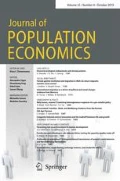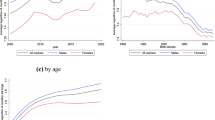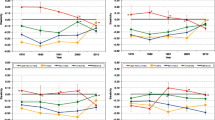Abstract
Numerous studies in the United States have confirmed that individuals born into large cohorts, ceteris paribus, tend to have lower earnings on entry into the labour force compared to individuals born into small cohorts. On the other hand, only limited attention has been directed towards exploring the relationship between cohort size and earnings in other nations. This paper examines empirically the relationship between cohort size and male earnings in Great Britain. The data used is a time-series of cross-sections (1973–1982) constructed from theGeneral Household Survey. Some support for the hypothesis that large cohorts have depressed earnings is found. However, this effect does not persist as the cohort ages.
Similar content being viewed by others
References
Alburg D (1982) The new Kuznets cycle: a test of the Easterlin-Wachter-Wachter hypothesis. Res Popul Econ 4:93–115
Alsalam N (1985) The effect of cohort size on earnings: an examination of substitution relationships. University of Rochester Center for Economic Research Working Paper No. 21, Rochester, New York
Anderson J (1982) An economic-demographic model of the US labor marker. Res Popul Econ 3:117–153
Bamford C, Dale A (1988) General household survey time series 1973–1982. Department of Sociology, University of Surrey, Guildford, UK
Ben-Porath Y (1988) Market, government, and Israel's muted baby boom. In: Lee R, Arthur W, Rodgers G (eds) Economics of changing age distributions in developed countries. Oxford University Press, Oxford, pp 12–38
Berger M (1988) Black-white earnings ratios: The role of cohort size. Econ Lett 26:285–290
Berger M (1985) The effect of cohort size on earnings: A reconsideration of the evidence. J Polit Econ 93:561–573
Berger M (1984) Cohort size and the earnings of young workers. Indust Labor Relat Rev 37:582–591
Berger M (1983) Changes in labor force composition and male earnings: A production function approach. J Hum Resources 18:177–196
Bloom D, Freeman R, Korenam S (1987) The labour-market consequences of generational crowding. Eur J Popul 3:131–176
Calot G, Blayo C (1982) Recent course of fertility in Western Europe. Popul Stud 36:349–372
Connelly R (1986) A framework for analyzing the impact of cohort size on education and labor earnings. J Hum Resources 21:543–562
Dooley M (1986) The overeducated Canadian? Changes in the relationship among earnings, education, and age for Canadian men: 1971–1981. Can J Econ 14:142–159
Easterlin R (1980) Birth and fortune: The impact of numbers on personal welfare. Basic Books, New York
Easterlin R (1978) What will 1984 be like? The socioeconomic implications of recent twists in age structure. Demography 15:397–432
Ermisch J (1988a) Fortunes of birth: The impact of generation size on the relative earnings of young men. Scott J Polit Econ 35:266–282
Ermisch J (1988b) British labour market responses to age distribution changes. In: Lee R, Arthur W, Rodgers G (eds) Economics of changing age distributions in developed countries. Oxford University Press, Oxford, pp 76–86
Ermisch J, Wright R (1989) Differential returns to human capital in full-time and part-time employment: The case of British women. Discussion Paper 88-14. Department of Economics, Birkbeck College, London
Freeman R (1976) The effects of demographic factors on age-earnings profiles. J Hum Resources 14:289–318
Gustafsson S (1990) Cohort size and female labor supply. Centre for Economic Policy Research Discussion Paper No. 384, London
Martin L, Ogawa N (1988) The effect of cohort size on relative wages in Japan. In: Lee R, Arthur W, Rodgers G (eds) Economics of changing age distributions in developed countries. Oxford University Press, Oxford, pp 59–75
Murphy K, Plant M, Welch F (1988) Cohort size and earnings in the United States. In: Lee R, Arthur W, Rodgers G (eds) Economics of changing age distributions in developed countries. Oxford University Press, Oxford, pp 39–58
Office of Population Censuses and Surveys (1989) OPCS Monitor. PP2 89 No. 1. HMSO, London
Office of Population Censuses and Surveys (1981) The General Household Survey. HMSO, London
Pestieau P (1989) The demographics of inequality. J Popul Econ 2:3–24
Riboud M (1987) Labour market response to changes in cohort size: the case of France. Eur J Popul 3:359–382
Tan H, Ward M (1985) Forecasting the wages of young men: the effects of cohort size. Report No. R.3115-Army, RAND Corporation, Santa Monica CA
Welch F (1979) Effects of cohort size on earnings: The baby boom babies financial bust. J Polit Econ (Suppl) 87:S65-S97
Wells W (1983) The relative pay and employment of young people. Research Paper No. 42. Department of Employment, London
Wright R (1989) The Easterlin hypothesis and European fertility rates. Popul Dev Rev 15:107–122
Wright R, Ermisch J (1991) Gender discrimination in the British labour market: a reassessment. Econ J 101:508–522
Author information
Authors and Affiliations
Rights and permissions
About this article
Cite this article
Wright, R.E. Cohort size and earnings in Great Britain. J Popul Econ 4, 295–305 (1991). https://doi.org/10.1007/BF02426373
Received:
Accepted:
Issue Date:
DOI: https://doi.org/10.1007/BF02426373




